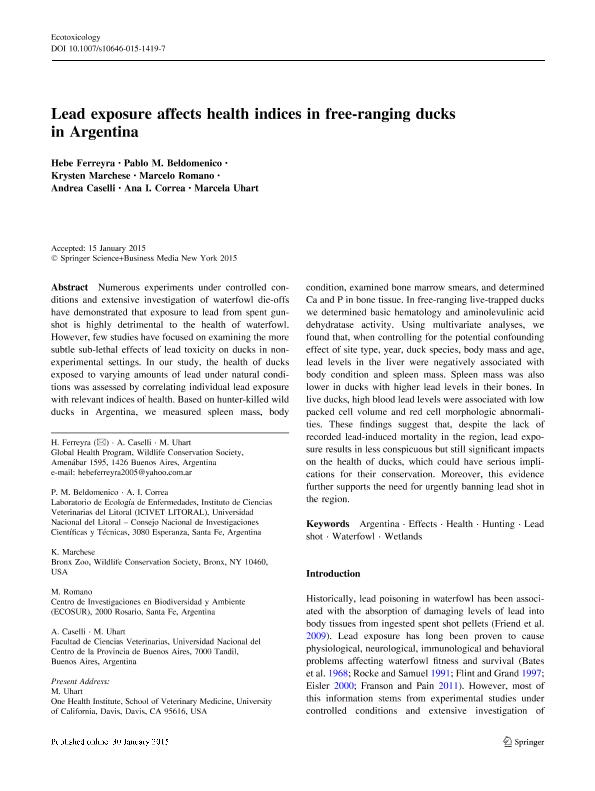Artículo
Lead exposure affects health indices in free-ranging ducks in Argentina
Ferreyra, Hebe; Beldomenico, Pablo Martín ; Marchese, Krysten; Romano, Marcelo; Caselli, Andrea; Correa, Ana Ines; Uhart, Marcela Maria
; Marchese, Krysten; Romano, Marcelo; Caselli, Andrea; Correa, Ana Ines; Uhart, Marcela Maria
 ; Marchese, Krysten; Romano, Marcelo; Caselli, Andrea; Correa, Ana Ines; Uhart, Marcela Maria
; Marchese, Krysten; Romano, Marcelo; Caselli, Andrea; Correa, Ana Ines; Uhart, Marcela Maria
Fecha de publicación:
05/2015
Editorial:
Springer
Revista:
Ecotoxicology
ISSN:
0963-9292
Idioma:
Inglés
Tipo de recurso:
Artículo publicado
Clasificación temática:
Resumen
Numerous experiments under controlled conditions and extensive investigation of waterfowl die-offs have demonstrated that exposure to lead from spent gunshot is highly detrimental to the health of waterfowl. However, few studies have focused on examining the more subtle sub-lethal effects of lead toxicity on ducks in non-experimental settings. In our study, the health of ducks exposed to varying amounts of lead under natural conditions was assessed by correlating individual lead exposure with relevant indices of health. Based on hunter-killed wild ducks in Argentina, we measured spleen mass, body condition, examined bone marrow smears, and determined Ca and P in bone tissue. In free-ranging live-trapped ducks we determined basic hematology and aminolevulinic acid dehydratase activity. Using multivariate analyses, we found that, when controlling for the potential confounding effect of site type, year, duck species, body mass and age, lead levels in the liver were negatively associated with body condition and spleen mass. Spleen mass was also lower in ducks with higher lead levels in their bones. In live ducks, high blood lead levels were associated with low packed cell volume and red cell morphologic abnormalities. These findings suggest that, despite the lack of recorded lead-induced mortality in the region, lead exposure results in less conspicuous but still significant impacts on the health of ducks, which could have serious implications for their conservation. Moreover, this evidence further supports the need for urgently banning lead shot in the region.
Palabras clave:
Argentina
,
Effects
,
Health
,
Hunting
,
Lead Shot
,
Waterfowl
,
Wetlands
Archivos asociados
Licencia
Identificadores
Colecciones
Articulos(ICIVET-LITORAL)
Articulos de INST. DE CIENCIAS VETERINARIAS DEL LITORAL
Articulos de INST. DE CIENCIAS VETERINARIAS DEL LITORAL
Citación
Ferreyra, Hebe; Beldomenico, Pablo Martín; Marchese, Krysten; Romano, Marcelo; Caselli, Andrea; et al.; Lead exposure affects health indices in free-ranging ducks in Argentina; Springer; Ecotoxicology; 24; 4; 5-2015; 735-745
Compartir
Altmétricas



